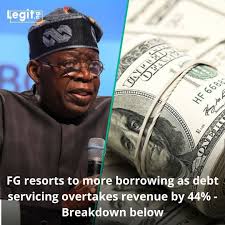…Delta, Lagos, Imo Lead As 33 states repay N1.8tn debt
…Niger, Enugu, Rivers sink further into debt with fresh N184bn borrowing
By Charles Ebi
Federal government has spent more than $7tn ,₦11.2tn, on servicing its external debt within the first 18 months of the President Bola Tinubu administration, with the International Monetary Fund as the highest beneficiary of the FG’s debt repayment drive.
This was contained in The Explainer magazine, a weekly publication of the National Orientation Agency, dated May 16, 2025.
It said, “As of June 30, 2023, a month after the president assumed office, Nigeria’s indebtedness to the IMF stood at $3.264bn.
“Six months later, specifically in December 2023, Nigeria’s IMF debt had shrunk to $2.469bn. One more year later ,December 2024, Nigeria has further reduced its indebtedness to the IMF to only $800.23m.
“This $800.23m balance at the end of 2024 has now been totally cleared in the second quarter of 2025, as confirmed by the IMF.
“So, essentially in less than two years of Tinubu’s administration, Nigeria has paid off its entire $3.264bn indebtedness to the IMF”.
Among other debts repaid by the FG are the N22trn securitised Ways and Means arrears, the first N100bn Sukuk bond offering issued in 2018, and ₦5.87trn in domestic debt paid off in 2024.
The publication also noted that domestic debts had gulped the sum of ₦8.81tn in 18 months, while Nigeria’s total public debt stock “has dropped drastically from $113.42bn as of June 2023 to $94.22bn as of December 31, 2024″.
This is just as the Federal Government has said that 33 states and the Federal Capital Territory have reduced their debt profiles, having repaid about ₦1.85trn in domestic debt between June 2023 and December 2024.
“Today, at least 33 states and the Federal Capital Territory ,FCT, have reduced their domestic debt portfolios at an unprecedented rate. Thus, within a period of 18 months, spanning June 2023 to December 2024, these states have repaid a whopping total sum of N1.85tn to their creditors”, the publication read.
The NOA further disclosed that the 36 state governments and the FCT had accumulated a domestic debt stock of N1.66trn as of December 2014. By the end of 2015, their domestic debt profiles had risen to ₦2.5tn.
However, by June 30, 2023, the total domestic debt of the 36 states and the FCT had reached over ₦5tn.
“Thus, states such as Osun moved from a debt profile of ₦37.82bn in 2014 to a whopping ₦145.71bn in June 2023, when President Tinubu assumed office. Delta, one of the highest receivers of FAAC allocations, also moved from N211.95bn in debt in 2014 to N465.41bn by 30 June 2023.
“In the same vein, Jigawa sank from ₦1.57bn debt in 2014 to ₦43.13bn in June 2023, while Imo went from ₦28.95bn in 2014 to ₦220.84bn in June 2023. Anambra’s domestic debt surged from N2.88bn in 2014 to N76.4bn in June 2023, and Sokoto moved from N7.65bn only in 2014 to N91.68bn in June 2023,” the publication further read.
The NOA explained that the Tinubu administration’s twin policies of ending the petrol subsidy and floating the naira were “tremendous blessings to the states”, leading to a freeing up of revenues, with states witnessing a leap in federal allocations.
The agency also disclosed that of the 33 states, Delta, Lagos, Imo, Cross River and Ogun states top the list, with Delta repaying N265.83bn, Lagos N96.23bn, Imo N94.70bn, Cross River N85.91bn, and Ogun State N81.35bn.
“However, there are only three states which failed to reduce their debt profiles. They are Niger, Enugu and Rivers States. Instead of following the footsteps of their colleagues, these states borrowed more.
“Thus, between June 2023 and December 2024, Niger State increased its debt burden by N18.79bn. In the same vein, Enugu State borrowed an additional N26.09bn, while Rivers State increased its debt by N138.89bn within 18 months”, the NOA stated.


